In 2012, I embarked on an eccentric project. Having realised how anglocentric my reading was, I decided to try to read a novel, short story collection or memoir from every UN-recognised country, plus former UN member Taiwan (then 196 nations in all), in a calendar year.
I set up a blog, ayearofreadingtheworld.com, and asked the world’s book lovers to help me. Pretty soon suggestions – and even books, manuscripts and unpublished translations – were flooding in from around the planet.
My criteria for choosing the titles I read varied and developed throughout the year. Sometimes I opted for national favourites. At other times I picked wildcards that intrigued me because they seemed at odds with the society that had produced them, such as works by exiled writers. And there were narratives that challenged my preconceptions in a huge number of ways.
Not all the books I read were set in the countries in question, but many were evocative of the regions they describe. Since then I’ve continued to seek out books that transport me to a different place. Here are 10 of my favourites:
I set up a blog, ayearofreadingtheworld.com, and asked the world’s book lovers to help me. Pretty soon suggestions – and even books, manuscripts and unpublished translations – were flooding in from around the planet.
My criteria for choosing the titles I read varied and developed throughout the year. Sometimes I opted for national favourites. At other times I picked wildcards that intrigued me because they seemed at odds with the society that had produced them, such as works by exiled writers. And there were narratives that challenged my preconceptions in a huge number of ways.
Not all the books I read were set in the countries in question, but many were evocative of the regions they describe. Since then I’ve continued to seek out books that transport me to a different place. Here are 10 of my favourites:
Bhutan
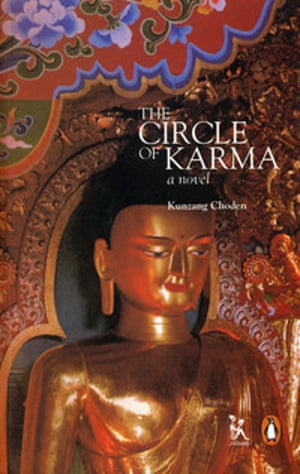
The Circle of Karma by Kunzang Choden
Following a young woman on her quest for enlightenment, this novel takes readers on a tour of the Buddhist gompas of the Himalayas in Bhutan and northern India, revealing marvels along the way. Seeing the religious sites through the eyes of a believer is a powerful experience, as are the descriptions of the majestic landscape and desperate living conditions the protagonist encounters. It is also the first book by a female Bhutanese author to be published outside Bhutan.
Switzerland
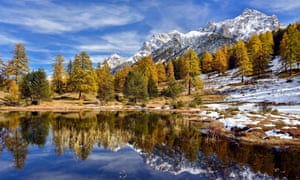
Snow-covered mountains and autumnal forest reflected in the Lai Nair, Tarasp, Switzerland. Photograph: Alamy
Beauty on Earth by Charles-Ferdinand Ramuz, translated from the French by Michelle Bailat-Jones
The early-20th-century Swiss writer Charles-Ferdinand Ramuz uses a visual artist’s sensibility to capture life on the shores of a central European lake in this tale of a young Cuban immigrant’s arrival in a rural community. Small details are rendered with fine brushwork: “a ladder of sunshine … descended from a hole in the sky,” a leaf “wrinkled up … like a duck’s foot”. The result is a mesmeric picture, from which we can step back in the final pages to appreciate the full effect.
Angola
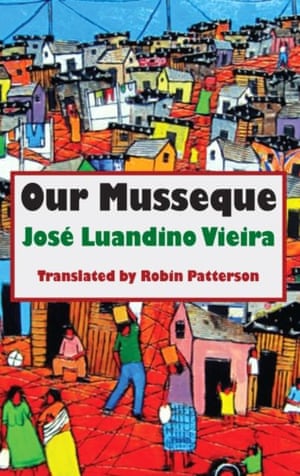
Our Musseque by José Luandino Vieira, translated from the Portuguese by Robin Patterson
The shanty towns in Luanda, the capital of Angola, in the 1940s and 1950s, come are vividly depicted in this idiosyncratic novel published more than 40 years after the author wrote it, in prison. Prostitutes, shopkeepers, children and drunks jostle and collide, giving conflicting accounts of their experiences as the civil war approaches, a conflict that will change their lives for good. Funny, shocking and moving, it makes you nostalgic for a place you have never been.
South Africa
The township of Soweto, Johannesburg. Photograph: Ben Curtis/AP
African Delights by Siphiwo Mahala
Roving between South Africa’s townships and the country’s wealthier districts, this irreverent, bold and engrossing collection of interlinked stories captures the complexities, contradictions and tensions of the country in the late 20th century. The sharp contrasts in the settings highlight the injustices woven into the society, while the humour and winning audacity of many of the disadvantaged characters make the cruelty of the insults they have to live with all the more telling. At times you feel as though you are sitting at their kitchen tables listening to their stories.
African Delights by Siphiwo Mahala
Roving between South Africa’s townships and the country’s wealthier districts, this irreverent, bold and engrossing collection of interlinked stories captures the complexities, contradictions and tensions of the country in the late 20th century. The sharp contrasts in the settings highlight the injustices woven into the society, while the humour and winning audacity of many of the disadvantaged characters make the cruelty of the insults they have to live with all the more telling. At times you feel as though you are sitting at their kitchen tables listening to their stories.
Myanmar
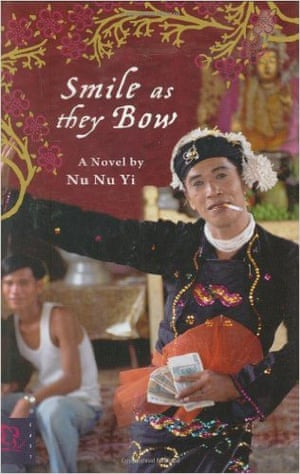
Smile as they Bow by Nu Nu Yi, translated from the Burmese by Alfred Birnbaum and Thi Thi Aye
A spirit festival in a small Burmese village is the backdrop to this absorbing novel, one of the few books from Myanmar to have been translated into English. Nu Nu Yi’s sensual descriptions of the hustle and bustle of the event – to which people from all walks of life flock to pay dancers to perform as a way of atoning for their misdeeds and drawing down blessings – are a joy to read. The colourful setting is second only to the vitality of the central character, Daisy Bond, a foul-mouthed transgender spirit dancer with a talent for deception.
Pakistan
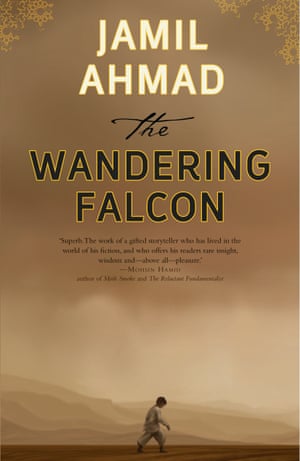
The Wandering Falcon by Jamil Ahmad
Some descriptions can be as breathtaking as the landscapes they depict, and Pakistani author Jamil Ahmad’s certainly fits into that category. As the novel follows his nomadic protagonist, Tor Baz, the wild and treacherous hill country around the borders of Pakistan, Iran and Afghanistan unfolds in all its harsh beauty. Reading the book can feel like picking your way over its mountain crags, or standing on the plains watching pursuers approach through the clouds of dust whipped up by the region’s 120-day winds.
Grenada
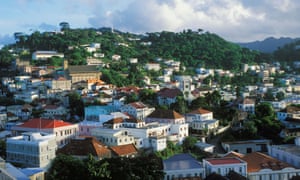
St George’s, the capital of Grenada. Photograph: Nik Wheeler/Alamy
The Ladies are Upstairs by Merle Collins
Psychogeography has a significant role to play in this lively collection of short stories, in which colonial history haunts the landscape of present-day Grenada. Eerie encounters on lonely roads and the pomp of the architecture of centuries past combine to present a richer and more engrossing picture of the “Island of Spice” than tourist brochures could ever do. Through it all runs a powerful sense of community, warmth and humanity.
Equatorial Guinea
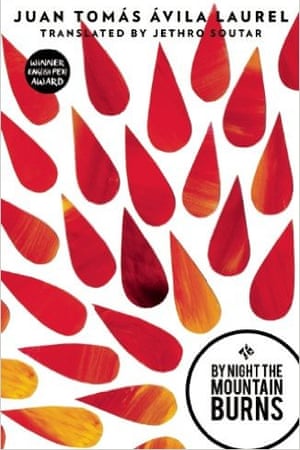
By Night the Mountain Burns by Juan Tomás Ávila Laurel, translated from the Spanish by Jethro Soutar
The tiny isle of Annobón, a province of Equatorial Guinea, bursts from the page in this glorious novel. Packed with details about island life: from how you make a canoe out of a tree trunk and the practicalities of cutting dates off palm trees, to the songs and superstitions that bind the society together. The book bubbles with interest, while its narrative is based on the region’s oral traditions. As a result it melds the familiar with the strange to draw us into the landscape and community of the island. This is only the second novel from Equatorial Guinea to be translated into English, so it is a rare and precious window on a little-known part of the globe.
UK/Wales

Martha Jack and Shanco by Caryl Lewis, translated from the Welsh by Gwen Davies
The west Wales landscape is a key player in this haunting novel about three ageing siblings who have spent their lives on their parents’ farm. Lewis writes in such a way that the harsh cold and comfortlessness of the place seem to seep out of the pages to hold you in their grip, even as flashes of natural beauty burst from the text. It is a stark reminder that you don’t have to travel far from home to find yourself in a different world.
Peru
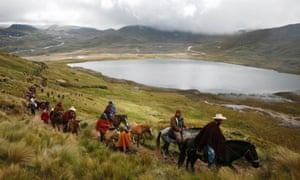
Perol lake in Peru’s Cajamarca region. Photograph: Enrique Castro-Mendivil/Reuters
Death in the Andes by Mario Vargas Llosa, translated from the Spanish by Edith Grossman
Peruvian Nobel prize-winner Mario Vargas Llosa’s chilling tale is of murder, terrorism and vengeful spirits in the mountains. At once menacing and beautiful, his landscape is as unpredictable as the bands of outlaws that roam through it, plaguing the imagination of Corporal Lituma and his junior officer, who are charged with investigating disappearances in the mining community around their post. Unsettling and memorable.
• Beside Myself by Ann Morgan is published by Bloomsbury Circus (£12.99) on 14 January 2016. To order a copy for £10.39, including UK p&p, visit the Guardian Bookshop

No comments:
Post a Comment